May 16th 2007 - Slug Patrol and In Praise of Broughton Woods
April and May seem to have swapped this year; while April was warm and very dry, much of May has so far been drenching. Iíve got about a hundred pots of plants waiting to go in, but itís been too wet to plant them out. For the large part of it, there are Heleniums, Calendulas, herbaceous Potentillas, Achilleas and Liatris spicata. There is still rain in the forecast for the next few days, but Iím hoping that it will clear up soon and I can get it all done.
"That means only one thing: a nocturnal slug patrol..."
I put in one well-grown Liatris spicata to see if the slugs would go for it. I asked one of the stall holders at the Harrogate Show the other week what they thought and they said they didnít think the plant should be troubled. In it went, with a dense surround of sharp grit, just in case. In two days, it had been all but finished off. We have blackbirds, thrushes, frogs and visiting hedgehogs, but we obviously have some sort of super slug here because the wild life donít seem to be keeping on top of it.
That means only one thing: a nocturnal slug patrol to collect and dispose of them. Oh, how I hate the job, itís disgusting. You creep about in the dark, with your torch and bucket, wearing rubber gloves, and spend an hour or so picking up the nasty slimy things to put in your bucket. Naturally enough, they try to climb out again and you have to keep pushing them back down. Once youíve collected about 50, and theyíre all sliming about together, you canít help but notice a sort of slick, bubbling noise. Not sure what it is about that sound, exactly, but itís enough to make me heave.
As itís May, my favourite time of year, weíve had a few trips over the road into the woods to see how this fast spring/early summer is coming along. It seems to us that the blossoms have never been so full as weíve seen them this year, and never have we noticed the hedgerow and woodland plants flowering so early. Everything is a clear month ahead of previous years. Spring was a brief interlude between winter and summer, it barely seemed to last a fortnight.
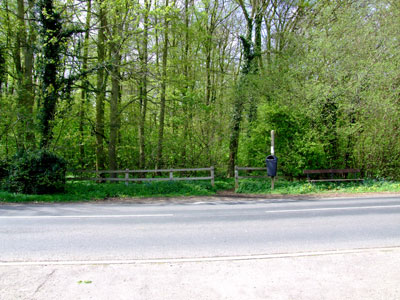
The entrance to the woods over the road
The woods are a glorious place during any April but this year, they have surpassed themselves. Broughton woods has a rich variety of plants growing in it and there are a number I like to watch out for at this time of year; they are harbingers of warmer weather and many are indicators of ancient woodland. More info on ancient woodland indicators.
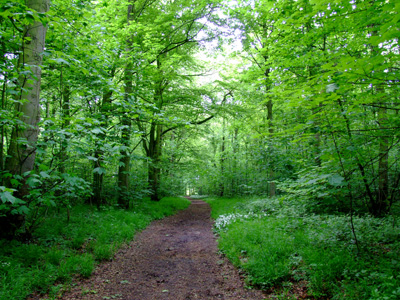
The path I often take through the woods
First, and one of the most beautiful, is Yellow Archangel (Lamiastrum galeobdolon), which grows in the dappled shade of the beech trees. As the leaves move, they light up yellow nettle-like flowers which, up close, bear delicate brown markings on the lower lip, the flowerís landing pad for pollinating insects.
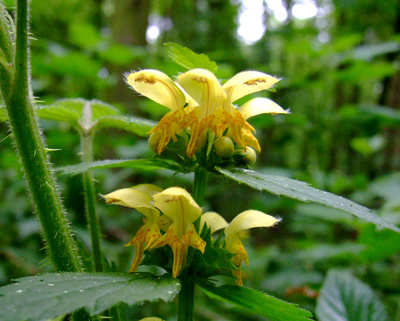
Yellow Archangel
They can often be found growing with an elegant grass, wood melick (Melica uniflora). This one has lush, bright green leaves and bears nodding panicles of tiny dark flowers, which open to buff. By high summer it has all died down and you wouldnít know it was there.
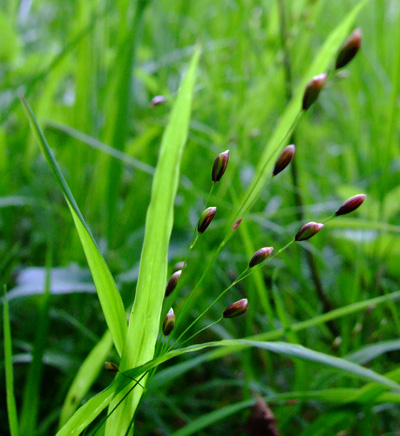
Melica uniflora
Further along the path, you come to what we call Ďthe main junctioní where four paths meet. There is a sort of Ďislandí in the middle, triangular and with half a dozen or so beech trees on it. This small area is one of my favourite parts of the woods and here are two more plants I like particularly to look out for, Yellow Pimpernel (Lysimachia nemorum) and Silver weed (Potentilla anserina). Both have simple, open yellow flowers and are low-growing. I had never seen Yellow Pimpernel before we came here, itís very much like Scarlet Pimpernel but with larger, bright yellow flowers. There is something about this uncomplicated, bright little plant that is immediately cheering.
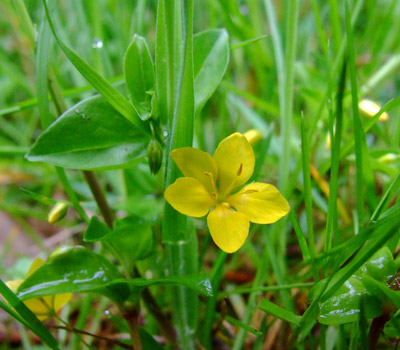
Yellow Pimpernel
Silverweed grows all over the woods, but this spot is where I first saw it and wondered at its rosettes of soft, silvery foliage, so I like to look at it here best of all. The flower is very similar to a buttercup flower, being a simple, open cup shape. The roots are edible and it is said that they taste a bit like parsnip and they were used in times of hardship or famine.
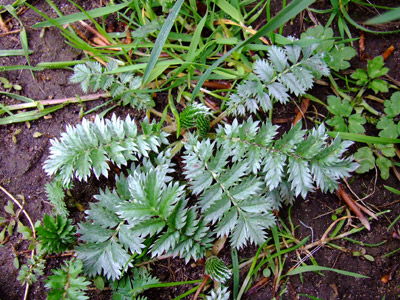
Silverweed
Also on this small island are wood anemones (Anemone nemorosa), wood sorrel (Oxalis acetosella), Lily-of-the-valley (Convallaria majalis) and dog violet (Viola canina).
Just around the corner from the island, the path is lined with mature beech trees. A couple of years ago, youíd see primroses growing in the grass but this year, for the first time that I recall, it is lined with cowslips instead and there are more bluebells than usual. Has someone been planting or spreading seed here, I wonder?
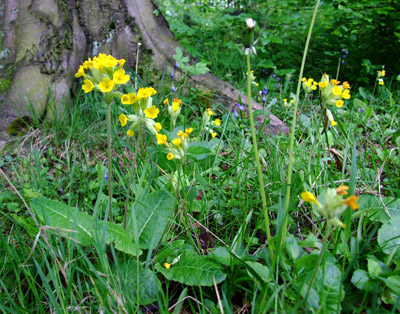
Cowslips
The final thrill of one day was when Karl found a beautiful longhorn moth, a female Adela reaumurella. Seeing it with its wings closed, we thought it was a beetle and it took a while to identify it, as we were looking in the wrong place. Such a lovely creature deserves a common name, even Common Golden Longhorn would do until someone thought of something more poetic. Iíll coin it to be going on with.
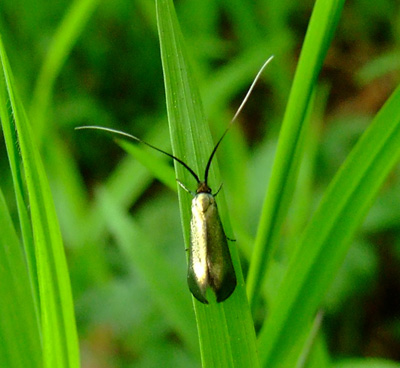
Adela reaumurella
Itís recently been written that a walk in the woods can alleviate depression and stress and I couldn't agree more. I can be as cross, fed up or muddle-headed as you like, but as soon as Iím five minutes down the path, Iím calmer or my thoughts are settling into a more coherent pattern.
Itís a wonderful place to go when youíre looking for ideas, whether for a planting plan or figuring out the code for a tricky interaction in Flash. Is it the greenness, the details, the sounds? I donít know, but my heart lifts when I step through the gateway of Ďover the roadí and I am so glad that Iíve had the opportunity of getting to know this place.
© Copyright Miranda Hodgson 2007